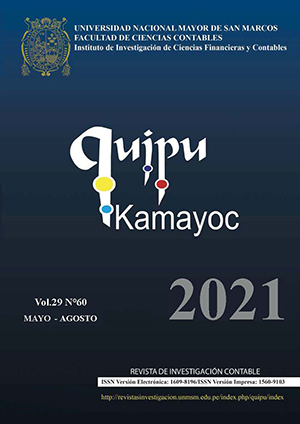Accounting and tax aspects of earnings under the scope of the peruvian tax legislation
DOI:
https://doi.org/10.15381/quipu.v29i60.20194Keywords:
Accrual, Tax Court, Taxpayers, Income Tax, IFRS 15Abstract
Objectives: Describe technically the accounting and tax aspects of the accrual under the scope of the Peruvian tax legislation and identify a trend in the interpretation of the matter in the tax field for its application therein. Method: The research was quantitative, cross-sectional, non-experimental and descriptive in scope. The sample was made up of the various conclusions of the Tax Court from 1997 to 2017. Results: The results of the investigation show that 68% of the resolutions issued by the Tax Court consider an accounting concept compared to 32% that take a legal concept to resolve the controversy facing the accrual. Conclusion: In conclusion, there is a significant trend in the use of the accounting concept by the Tax Court from 1997 to 2017 for its application in the Income Tax Law, given that seven out of ten cases were solved under an accrual accounting concept; because of this, it is necessary to incorporate an accrual concept in the Income Tax Law, whose validity is as of fiscal year 2019 in order to mitigate said controversy that was given in the previous years.
Downloads
Downloads
Published
Issue
Section
License
Copyright (c) 2021 Bill Frank Oscanoa Ponce, Ronald Studer Lévano Huamaccto

This work is licensed under a Creative Commons Attribution 4.0 International License.
AUTHORS RETAIN THEIR RIGHTS:
a. Authors retain their trade mark rights and patent, and also on any process or procedure described in the article.
b. Authors retain their right to share, copy, distribute, perform and publicly communicate their article (eg, to place their article in an institutional repository or publish it in a book), with an acknowledgment of its initial publication in Quipukamayoc .
c. Authors retain theirs right to make a subsequent publication of their work, to use the article or any part thereof (eg a compilation of his papers, lecture notes, thesis, or a book), always indicating the source of publication (the originator of the work, journal, volume, number and date).






